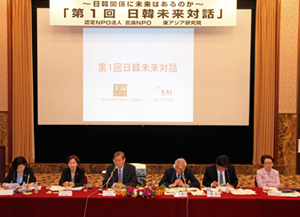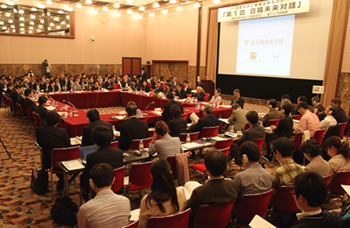
Prominent opinion leaders from Japan and South Korea agreed at a Tokyo forum May 11 to overcome the differences in historical perceptions and the territorial dispute between the two neighboring countries through future-oriented private-sector debate.
They also agreed that the sour bilateral relations should be rectified by finding common ground and common agendas on which both countries could collaborate to address pressing issues in East Asia, if not global ones.
The First Japan-Korea Future Dialogue, organized by the Genron NPO and South Korean think tank East Asia Institute (EAI), was attended by nine Japanese politicians, journalists and other prominent figures, including Yoriko Kawaguchi, former Minister for Foreign Affairs, Kazuo Ogura, former Ambassador to South Korea, and Shintaro Ito, a former Parliamentary Senior Vice-Minister for Foreign Affairs.

The 10-member Korean delegation included Tae-sik Lee, a former ambassador to the United States, Yul Sohn, dean of the Graduate School of International Studies at Yonsei University, and Hee-jung Kim, a member of the National Assembly, Saenuri Party. Some 200 people observed the debate.
The forum was organized at a time when Japan-South Korea ties are strained over Japan's reinforced sovereignty claim to a pair of islets in the Sea of Japan, now controlled by South Korea. The sour relations intensified last month as more than 100 Diet members, including three Cabinet ministers, visited the controversial Yasukuni Shrine in Tokyo, forcing South Korea to cancel its foreign minister's visit to Japan in protest.
As anticipated, some South Korean delegates sternly criticized Japan for its inclination to water down or negate its past misdeeds toward Korea, ranging from Toyotomi Hideyoshi's invasions of Korea (1592-1598) to Japan's annexation of Korea (1910-1945).
Lee Sook-Jong, president of the East Asia Institute, told the round-table forum that differences in historical perceptions and the territorial row have made South Korean people distrust Japan, as shown by the findings of the Japan-Korea Joint Opinion Poll, conducted jointly by the Genron NPO and her think tank.
According to the survey results, which were released May 7, nearly 80 percent of South Koreans have a negative impression of Japan while about 40 percent of Japanese have an unfavorable image of South Korea. (See the full text of the results of the joint opinion poll).
Particularly, Lee pointed to the wartime sex slave system, the so-called "comfort women" issue, and insisted that the Japanese government should take sincere and visible measures to assist the surviving ex-comfort women while they are alive.
Sohn of Yonsei University warned that the recent moves in Japanese politics, including the stepped-up efforts by some political leaders toward the revision of the postwar pacifist Constitution, are causing many citizens in his country to have misgivings about the revival of militarism in Japan.
Another delegate from South Korea proposed that Japan separately enshrine Class-A war criminals as proof that Japan would never return to the days of prewar militarism.
Some Japanese delegates rebutted these oft-repeated allegations against Japan by pointing to the formal apologies made by successive Japanese prime ministers, most notably the statement issued by then Socialist Prime Minister Tomiichi Murayama on the occasion of the 50th anniversary of the war's end in August 1995.
Former Parliamentary Vice-Minister for Foreign Affairs, Ito said that Japanese people, including politicians, who are visiting Yasukuni Shrine, just want to honor the war dead, as people in other countries do.
Former Minister for Foreign Affairs, Kawaguchi said that the territorial dispute and the question of historical perceptions should not affect overall bilateral relations.
Ogoura, who chaired the Japanese delegation, in his closing remarks, said that both countries could share the future by overcoming the issues of the past, adding that Japan and South Korea should hold more serious discussions about the desirable shape of their future bilateral relations.

In winding up the forum, Yasushi Kudo, representative of the Genron NPO, told a joint media conference that the gathering could be the first new step toward the formation of future-looking Japan-South Korea relations through dialogue. The EAI's Lee shared the view with Kudo, saying that the forum differs from other conventional channels of dialogue in that ordinary citizens are taking part in the debate.
The second forum is to be held in Seoul next year.
⇒ Why the Genron NPO has launched the new Japan-Korea grassroots dialogue
Post a comment